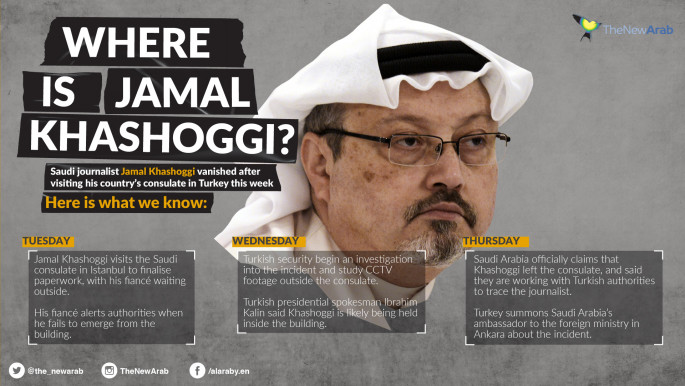
Khashoggi disappearance: Saudi Arabia casts its sinister net wider than ever
Turkey's presidential spokesperson Ibrahim Kalin said on Wednesday that Khashoggi remained inside the Saudi consulate. Meanwhile, a Saudi official quoted by Reuters claimed that Khashoggi was "not in the consulate nor in Saudi custody".
In the face of sustained concern about Khashoggi's whereabouts, the Saudi press have reported that the consulate in Istanbul is, as of Thursday, "carrying out the follow-up procedures and coordination with Turkish local authorities to uncover the circumstances of the disappearance of Jamal Khashoggi after he left the consulate building".
A US State Department representative said the department was also monitoring the situation, since Khashoggi has lived in the United States since September 2017 and has become even more prominent in American circles writing as a columnist for The Washington Post.
Khashoggi's disappearance is not, in and of itself, surprising. He is not the first or only high-profile dissenter to have been jailed, and even stated in his writing that he would likely have been arrested if he had stayed in Saudi Arabia.
More interesting than the arrest itself is the Saudi reaction, which appears to be shifting blame for Khashoggi's disappearance to Turkish authorities, rather than defending the detention of a dissident.
 |
Even those whose high-profile and connections in international circles we might expect to protect them, are still ultimately at the mercy of the Saudi government |  |
Notably, Khashoggi would not be the only Gulf national to have been arrested abroad to be returned to the kingdom, and other incidents have been far more public. For instance, Nawaf Talal al-Rasheed, a Qatari national and a cousin of famed Saudi academic and critic Madawi al-Rasheed, was arrested in Kuwait and passed to Saudi authorities "under bilateral mutual security arrangements between Kuwait and Riyadh".
Similarly, Saudi activist Loujain al-Hathloul was arrested in the UAE and returned to Saudi Arabia earlier this year. Khashoggi is, however, the first Saudi national whose arrest - if that is indeed what has happened - appears to have taken place in a country that is neither a Gulf neighbour nor a close ally.
As others have noted, this incident will likely heighten existing tensions between Saudi Arabia and Turkey that have been reawakened in light of the GCC rift, in which Turkey has decidedly sided with Qatar, ramping up trade relations and enhancing military ties with the blockaded state.
That the Saudi authorities would potentially risk detaining Khashoggi at a consulate in a country with which ties are already tenuous signals just how important Khashoggi is to Riyadh.
Read more: Jamal Khashoggi fiancée speaks out over fears for disappeared writer's safety
He has 1.6 million followers on Twitter and has the benefit of having once had intimate access both to the ruling family and to Osama bin Laden at different times in his life. 
He is additionally well known in American circles, meaning his arrest could potentially even have repercussions in the US-Saudi relationship, though the Trump administration is unlikely to raise human rights concerns with its Saudi ally in a serious or sustained way.
Khashoggi's most recent columns for The Washington Post cover some of the most taboo subjects in Saudi Arabia: The need to end the ongoing war in Yemen, the moderate nature of the Muslim Brotherhood, and the need for domestic political reforms beyond allowing women the right to drive.
Further, his most recent pieces had been translated into Arabic, something which Ali Shihabi said was particularly contentious in his discussion about why a recent tweet from the Canadian ambassador spurred a major rift with Saudi Arabia.
 |
Khashoggi's most recent columns for The Washington Post cover some of the most taboo subjects in Saudi Arabia |  |
In one sense, then, Khashoggi's speculated arrest is consistent with previous Saudi policies and serves to highlight the extent to which dissenters, even those whose high-profile and connections in international circles we might expect to protect them, are still ultimately at the mercy of the Saudi government, no matter where they are.
That the Saudi government is not admitting to Khashoggi's potential detention and are instead insisting that his disappearance is the responsibility of a third party, indicates awareness of and at least some level of adaptation to the bad press that it has received from previous arrests.
This situation also, crucially, provides an opportunity for Saudi Arabia to portray Turkey as the type of place where people can be kidnapped from outside of a consulate for no obvious reason.
In the coming days, Saudi government statements will be important in indicating what has happened to Khashoggi and whether Saudi policies towards dissidents abroad may have become more interventionist.
Dr Courtney Freer is a senior advisor at Gulf State Analytics and a research officer for the Kuwait Programme at the London School of Economics and Political Science.
Follow her on Twitter: @CourtneyFreer
Opinions expressed in this article remain those of the author and do not necessarily represent those of The New Arab, its editorial board or staff.
![Jamal Saudi [Getty] Jamal Saudi [Getty]](/sites/default/files/styles/large_16_9/public/media/images/ED4722CD-BEC7-4D19-AEF5-4E3FAF519DBB.jpg?h=d1cb525d&itok=95l6ruso)




 Follow the Middle East's top stories in English at The New Arab on Google News
Follow the Middle East's top stories in English at The New Arab on Google News


